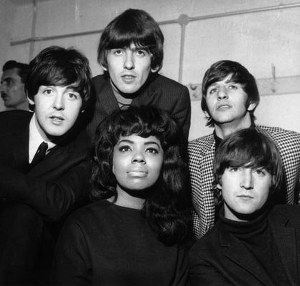Fact #105438
When:
Short story:
 A press release from The Beatles, half-way through a tour of the USA, states, "We will not appear unless Negroes are allowed to sit anywhere." The group had learned that blacks were confined to the balconies or upper tiers at public events such as concerts in cities including Jacksonville, Florida.
A press release from The Beatles, half-way through a tour of the USA, states, "We will not appear unless Negroes are allowed to sit anywhere." The group had learned that blacks were confined to the balconies or upper tiers at public events such as concerts in cities including Jacksonville, Florida.Full article:
Mark Lindsay (vocalist, Paul Revere And The Raiders) : At that time, no-one that I knew of really took the initiative to address any kind of social issues. I can see the Beatles coming over here and being assailed by this weird, unfair policy of segregation. They were not just good musicians. They had intellect. They spoke up.
Smokey Robinson : The Beatles were the first white artists to ever admit that they grew up and honed themselves on black music. I loved they fact that they did that, that they were honest and said, 'We listened to black people and this is how we groomed ourselves, and we listened to Motown'. They in fact recorded some Motown songs. I loved the fact that they did that.
Brian Hyland (pop vocalist) : They were really the first group to have the power to do that. They used that platform really well. They could`ve just let it ride and not said anything about it. It took a lot of courage.
Lou Christie (pop vocalist and songwriter) : We were, in many respects, just these goofy white boys. We weren`t allowed to be seen with a cigarette in our hands. We had press people watching who we went out with. The Beatles had a different attitude. They were more aggressive, they were funny and they were articulate. The minute they came to America, they literally put a halt to everything that was previously happening.
Paul McCartney : We weren't into prejudice. We were always very keen on mixed-race audiences. With that being our attitude, shared by all the group, we never wanted to play South Africa or any places where blacks would be separated. It wasn't out of any goody-goody thing; we just thought, Why should you separate black people from white? That`s just stupid, isn`t it?.
(Source : feature by Bill De Main, Mojo magazine, date not known)
Tweet this Fact
Smokey Robinson : The Beatles were the first white artists to ever admit that they grew up and honed themselves on black music. I loved they fact that they did that, that they were honest and said, 'We listened to black people and this is how we groomed ourselves, and we listened to Motown'. They in fact recorded some Motown songs. I loved the fact that they did that.
Brian Hyland (pop vocalist) : They were really the first group to have the power to do that. They used that platform really well. They could`ve just let it ride and not said anything about it. It took a lot of courage.
Lou Christie (pop vocalist and songwriter) : We were, in many respects, just these goofy white boys. We weren`t allowed to be seen with a cigarette in our hands. We had press people watching who we went out with. The Beatles had a different attitude. They were more aggressive, they were funny and they were articulate. The minute they came to America, they literally put a halt to everything that was previously happening.
Paul McCartney : We weren't into prejudice. We were always very keen on mixed-race audiences. With that being our attitude, shared by all the group, we never wanted to play South Africa or any places where blacks would be separated. It wasn't out of any goody-goody thing; we just thought, Why should you separate black people from white? That`s just stupid, isn`t it?.
(Source : feature by Bill De Main, Mojo magazine, date not known)